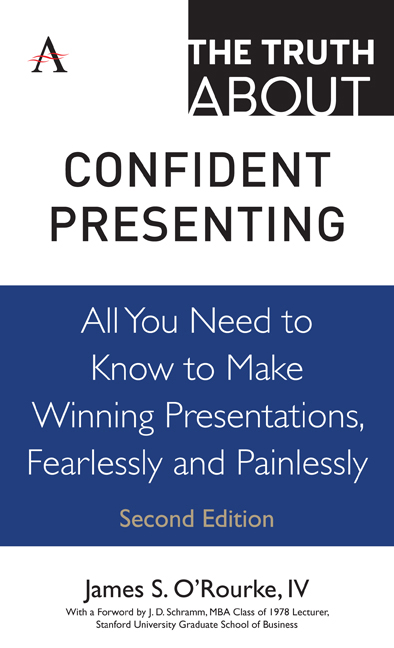 The Truth about Confident Presenting
The Truth about Confident Presenting Book contents
- Frontmatter
- Contents
- Foreword
- Introduction
- Part I Some Initial Truths
- Part II The Truth About Getting Ready to Speak
- Part III The Truth About What Makes People Listen
- Truth 13 Understand what makes people listen
- Truth 14 Your speaking style makes a difference
- Truth 15 Anticipate the questions your audience brings to your presentation
- Truth 16 Listening matters
- Truth 17 Being an active listener brings real benefits
- Truth 18 You can overcome the barriers to successful communication
- Part IV The Truth About Developing Support for Your Presentation
- Part V The Truth About Getting Up to Speak
- Part VI The Truth About Managing Anxiety
- Part VII The Truth About Nonverbal Communication
- Part VIII The Truth About Visual Aids
- Part IX The Truth About Handling an Audience
- Part X The Truth About What Makes a Presentation Work
- References
- Acknowledgments
- About the Author
Truth 14 - Your speaking style makes a difference
from Part III - The Truth About What Makes People Listen
- Frontmatter
- Contents
- Foreword
- Introduction
- Part I Some Initial Truths
- Part II The Truth About Getting Ready to Speak
- Part III The Truth About What Makes People Listen
- Truth 13 Understand what makes people listen
- Truth 14 Your speaking style makes a difference
- Truth 15 Anticipate the questions your audience brings to your presentation
- Truth 16 Listening matters
- Truth 17 Being an active listener brings real benefits
- Truth 18 You can overcome the barriers to successful communication
- Part IV The Truth About Developing Support for Your Presentation
- Part V The Truth About Getting Up to Speak
- Part VI The Truth About Managing Anxiety
- Part VII The Truth About Nonverbal Communication
- Part VIII The Truth About Visual Aids
- Part IX The Truth About Handling an Audience
- Part X The Truth About What Makes a Presentation Work
- References
- Acknowledgments
- About the Author
Summary
Among the factors that will quickly influence whether an audience wants to listen to you is your speaking style. We each have a style that we develop through practice, experience, watching and listening to others. That style has a great deal to do with how an audience will react when we begin speaking.
New York-based communication consultant Sonya Hamlin asked a number of people, including business managers, friends and associates about their reactions to various speaking styles. She compiled an impressive list of stylistic elements that are positive, as well as those that are negative.
Hamlin found that people react positively to speakers who are warm, friendly and interesting. What does warm mean? While that's a bit hard to define, most people certainly can tell if people are “warm” on meeting them. In the autumn of 1960, when John F. Kennedy was running for President of the United States against Richard Nixon, the two candidates agreed to a televised debate which would showcase each man's ideas, intellect and rhetorical skills.
The debate was broadcast on both television and radio. Surprisingly, judging who won seemed to depend directly on whether you saw the debate on TV or heard it on the radio. A scientific survey of people who tuned into the debate revealed that those who only listened to the exchange thought Richard Nixon had won. He answered the questions in detail, had good debating points, was specific about his policies and proposals, and seemed in command of the facts. People who saw the debate on television thought Jack Kennedy had won— hands down. Even though Kennedy evaded a number of questions and sidestepped some difficult issues, people were impressed with his demeanor, presence and charisma. In a word, they thought he was warm.
Audiences also like listening to people who are organized and confident. Organization helps, of course, because it's one more thing listeners won't have to do for themselves. And confidence wins friends. If you're not confident about this subject, why should the audience 14 give you their attention? If you show them your enthusiasm, they will reward you with their undivided attention.
- Type
- Chapter
- Information
- The Truth about Confident PresentingAll You Need To Know To Make Winning Presentations, Fearlessly And Painlessly, pp. 53 - 56Publisher: Anthem PressPrint publication year: 2019


